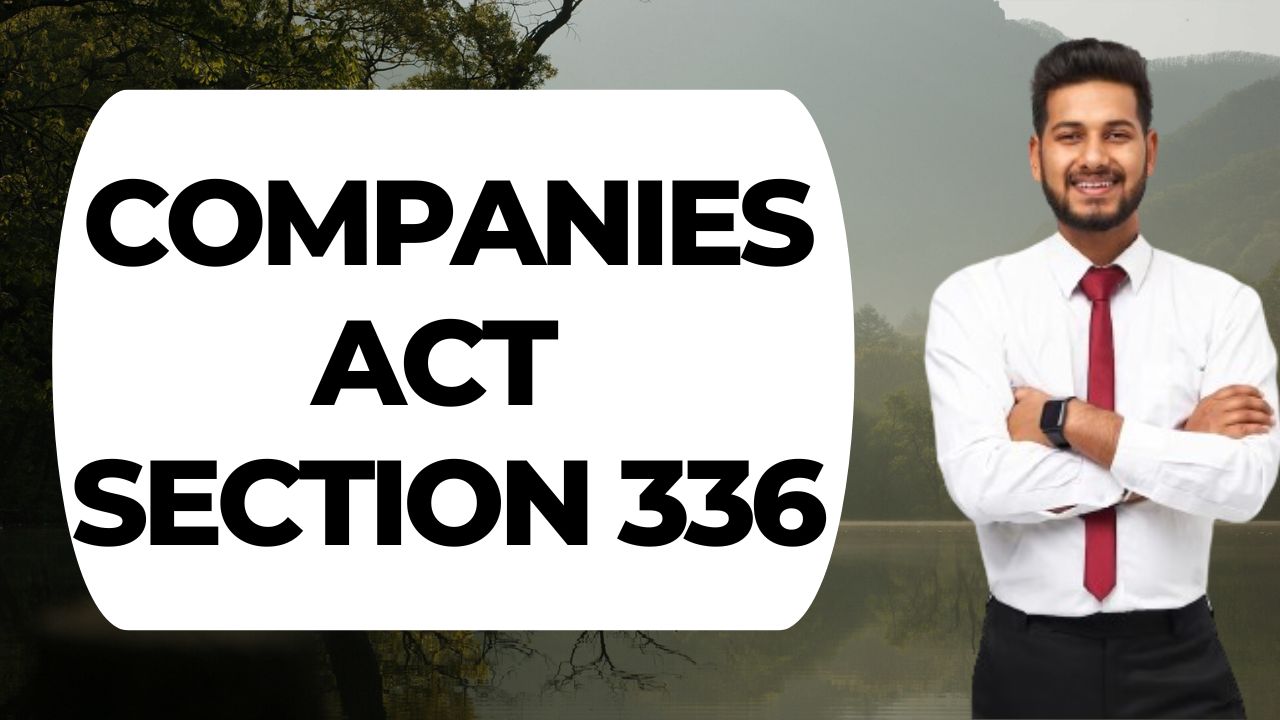
Companies Act, Section 337: Penalty for Fraudulent Acts Committed by Officers of a Company
Section 337 of the Companies Act, 2013 prescribes penal consequences for officers of a company who engage in fraudulent acts that lead to or contribute to the company’s insolvency or winding up. The provision is specifically designed to deter misconduct by persons in control of a company who induce others to provide credit, dispose of assets, or evade debt obligations through deception or dishonest intent. It imposes criminal liability on such officers even if the company is ordered to be wound up after the commission of the offence, provided they held the position of an officer at the time of the wrongdoing.
1. Scope and Applicability of Section 337
A person is an officer of a company at the time of committing the alleged fraudulent act, and that company is subsequently ordered to be wound up by the Tribunal under the Companies Act, 2013.
The provision holds such officers personally accountable for certain fraudulent actions that harm the interests of creditors or third parties.
The term “officer” is interpreted broadly to include directors, managers, key managerial personnel, and anyone exercising control over the affairs of the company.
2. Types of Fraudulent Conduct Punishable Under This Section
Section 337 identifies three specific categories of fraudulent behaviour committed by officers of a company prior to the commencement of winding up. These acts are treated as serious offences when committed with intent to defraud.
(a) Fraudulently Inducing a Person to Give Credit to the Company
If an officer, by way of False representations, or any other fraudulent means,
induces any person to extend credit to the company, such as by supplying goods, lending money, or providing services on the belief that the company is creditworthy or solvent, he shall be held liable.
This covers situations where creditors are deceived into entering into financial transactions with the company based on misleading assurances or concealment of material facts about the company’s financial position.
(b) Fraudulent Gifts, Transfers, or Charges Over Company Property
If, with the intention to defraud creditors or any other person, the officer:
Makes, or causes to be made, any gift, Executes or causes to be executed any transfer of company property, Creates or facilitates any charge over company property (such as a mortgage or lien), or Connives at or permits any execution (e.g., attachment or sale) to be levied against the company’s property, he will be criminally liable.
This clause targets conduct intended to divert or dissipate company assets so as to defeat or reduce the value available to creditors in the event of insolvency.
(c) Concealment or Removal of Company Property After a Judgment or Payment Order
Where an officer, with an intention to defraud creditors, has:
Concealed any part of the company’s assets, or removed such property from the company’s possession, and such act occurs:
After the date on which a judgment or order for the payment of money has been obtained against the company and remains unsatisfied, or within two months prior to that date, he shall be held criminally liable.
This provision seeks to punish those who deliberately frustrate the enforcement of judicial orders or judgments by hiding or moving assets out of reach of the creditors.
3. Punishment Prescribed Under Section 337
Any officer found guilty of the above offences under clauses (a), (b), or (c) of Section 337 shall face the following penalties:
Imprisonment for a term not less than one year, which may extend to three years, and fine of not less than ?1,00,000, which may extend to ?3,00,000.
This minimum mandatory punishment highlights the seriousness with which the law views fraudulent conduct by corporate officers and sends a strong deterrent signal.
4. Illustrative Examples
Example 1: A director of ABC Ltd. falsely assures a supplier that the company is financially sound and induces the supplier to extend a credit of ?10 lakhs. In reality, the company is insolvent, and the director is aware that repayment is unlikely. A few months later, the company is ordered to be wound up. The director is liable under Section 337(a).
Example 2: A managing director of XYZ Ltd., with the intent to shield company assets from creditors, gifts a valuable piece of machinery to a relative after a creditor obtains a money decree against the company. This act would fall under Section 337(b) as a fraudulent transfer of property.
Example 3: An officer hides ?5 lakhs in company cash in his personal locker two weeks after a court issues an order for recovery against the company. Such concealment, intended to defeat creditor claims, would constitute an offence under Section 337(c).
5. Significance of Section 337
Section 337 serves multiple purposes in the context of winding up:
It protects creditors from being misled by dishonest officers, It upholds the integrity of corporate credit and financial transactions.
It ensures transparency and honest conduct by those responsible for the company’s affairs, It discourages fraudulent depletion or diversion of assets that should otherwise be used to settle company liabilities during winding up.
By targeting officers who exploit their position to commit fraud prior to or during insolvency, this section ensures that personal accountability accompanies corporate responsibility.
© 2020 CREDENCE CORPORATE SOLUTIONS PVT. LTD. | Website by Wits Digtal Pvt. Ltd.
Leave a Comment